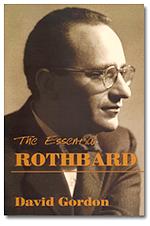by Paul Gottfried by Paul Gottfried
 In early 2007, the Ludwig von Mises Institute in Auburn, Alabama, published David Gordon’s enlightening study of his deceased friend and onetime teacher Murray N. Rothbard (1926—95). Although Gordon claims to have written the text with breakneck speed, The Essential Rothbard witnesses to its author’s great learning and measured judgments. It offers lucid discussions of Rothbard’s historical and economic writings and, like Justin Raimondo’s earlier work on the same thinker, it describes with verve and humor its subject’s early years in New York and decisive break with his family’s leftist politics. (One can imagine the consternation of Murray’s left-liberal parents when in 1948 he campaigned for the states-rightist Strom Thurmond for president.)
In early 2007, the Ludwig von Mises Institute in Auburn, Alabama, published David Gordon’s enlightening study of his deceased friend and onetime teacher Murray N. Rothbard (1926—95). Although Gordon claims to have written the text with breakneck speed, The Essential Rothbard witnesses to its author’s great learning and measured judgments. It offers lucid discussions of Rothbard’s historical and economic writings and, like Justin Raimondo’s earlier work on the same thinker, it describes with verve and humor its subject’s early years in New York and decisive break with his family’s leftist politics. (One can imagine the consternation of Murray’s left-liberal parents when in 1948 he campaigned for the states-rightist Strom Thurmond for president.)
Murray, who was widely known as “Mr. Libertarian,” was both a leading figure and a controversial dissenter in the postwar conservative movement. For someone who spent most of his life on the outs with his fellow rightists, primarily because of his opposition to military spending and his criticism of what he saw as attempts to invest the American Right with the “stench of European conservatism,” Murray nonetheless cast a long shadow upon the movement with which he fought. George H. Nash’s encyclopedic study The Conservative Intellectual Movement in America not only recounts Murray’s quarrels with conservatives — especially during the Vietnam War, which he vehemently opposed — but also abounds in multiple references to Mr. Libertarian. An unseemly obituary that National Review published at the time of his unexpected passing told less about the man who had just died than about the anger he had aroused as a controversialist. (May his tribe increase!)
Gordon goes through Murray’s early professional life with great diligence. We learn about his subject’s graduate studies at Columbia and about the mathematical skills he inherited from his chemical engineering father. Although as an Austrian-school economist Murray became skeptical of forecasting models, he did not do so as someone who was ignorant of mathematics. He knew enough about this discipline to question its doubtful applications, and particularly its attempts to second-guess the market. Gordon discusses how Murray built contacts with the Volker Fund, which generously funded his research. And he fills in details about Murray’s relationship with his mentor Ludwig von Mises, who gave a seminar at New York University that the university refused to subsidize but for which it charged rent.





